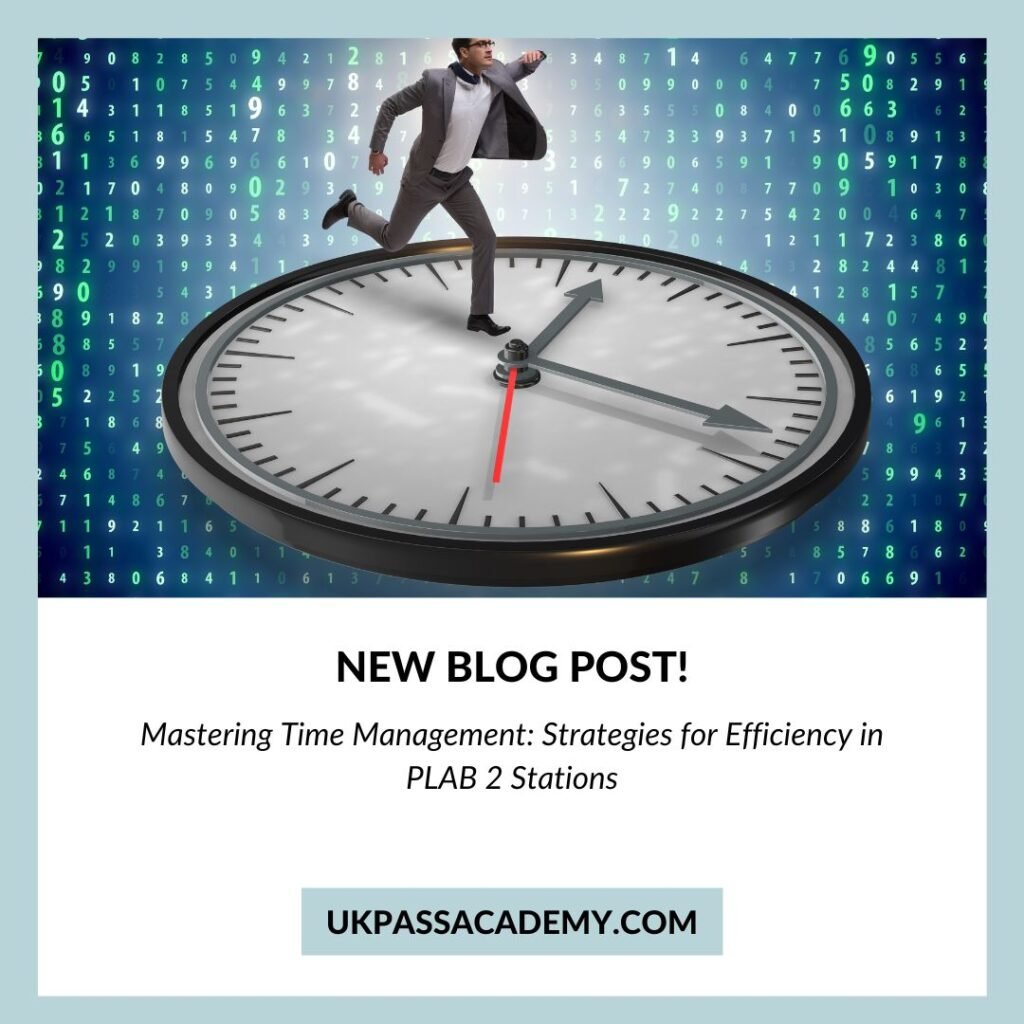The Professional and Linguistic Assessments Board (PLAB) 2 exam stands as a pivotal milestone for international medical graduates aspiring to practice medicine in the UK. This practical assessment evaluates clinical skills and knowledge through simulated patient encounters across various stations. Within this rigorous examination framework, one of the most critical determinants of success is efficient time management. In this comprehensive article, we delve into the significance of time management in PLAB 2 stations and explore a range of strategies aimed at enhancing efficiency.
Understanding the Structure of PLAB 2 Stations
PLAB 2 stations are designed to simulate real-world clinical scenarios encountered by medical practitioners. Each station encompasses a distinct set of tasks, such as history taking, physical examination, clinical reasoning, communication skills, and ethical decision-making. Candidates are allocated specific time frames for each station, typically ranging from 10 to 20 minutes. Understanding the structure and demands of these stations is paramount for effective time management.
Common Challenges in Time Management during PLAB 2
Despite the best intentions, candidates often encounter a myriad of challenges that impede effective time management during PLAB 2 stations. One prevalent issue is the difficulty in prioritizing tasks within the allocated time, leading to inefficient utilization of resources. Moreover, the high-pressure environment of the exam setting can exacerbate stress levels, impairing candidates’ ability to make timely and sound decisions. Without adequate preparation and practice, candidates may find themselves grappling with time constraints, compromising their performance in crucial station tasks.
Strategies for Efficient Time Management in PLAB 2 Stations
- Prioritization Techniques: Adopting effective prioritization strategies is paramount to optimizing time management in PLAB 2 stations. Candidates should strive to identify high-yield tasks that are central to patient care and clinical decision-making. By making quick yet informed decisions regarding task priority, candidates can allocate their time more efficiently, ensuring that essential components of each station are addressed within the stipulated timeframe.
- Structured Approach to Stations: A structured approach provides candidates with a systematic framework for navigating the complexities of PLAB 2 stations. This approach typically involves breaking down station tasks into distinct phases, including introduction, history taking, physical examination, and closure. By adhering to a predefined structure and utilizing mnemonic devices and checklists where applicable, candidates can streamline their workflow and ensure comprehensive coverage of station requirements within the allotted time.
- Practice and Familiarization: Engaging in regular practice sessions and mock exams is instrumental in familiarizing candidates with the format and timing constraints of PLAB 2 stations. Simulated practice sessions offer candidates the opportunity to hone their time management skills in a controlled environment, allowing them to identify areas for improvement and refine their approach accordingly. Additionally, exposure to a diverse range of clinical scenarios through mock exams enables candidates to develop adaptive strategies that can be applied flexibly during the actual exam.
- Time-saving Techniques: Employing time-saving techniques can significantly enhance efficiency during PLAB 2 stations. Effective note-taking methods, such as the use of shorthand or structured templates, enable candidates to capture relevant information succinctly without compromising the quality of documentation. Furthermore, refining communication skills, including active listening and concise articulation, can expedite interactions with simulated patients, facilitating the efficient gathering of clinical data and the dissemination of diagnostic and therapeutic recommendations.
- Mental Preparation and Mindfulness: The psychological aspect of time management cannot be overstated in the context of PLAB 2 stations. Candidates must cultivate mental resilience and mindfulness techniques to mitigate stress and maintain focus under pressure. Strategies such as deep breathing exercises, visualization, and positive self-talk can help alleviate anxiety and enhance cognitive function, allowing candidates to approach station encounters with confidence and clarity of thought.
Implementing Time Management Strategies: Practical Tips and Advice
Implementing time management strategies requires a proactive and disciplined approach. Candidates should develop a personalized study plan that emphasizes the cultivation of time management skills alongside clinical knowledge acquisition. Seeking feedback from peers and instructors can provide valuable insights into areas for improvement, enabling candidates to refine their approach iteratively. It is essential to strike a balance between speed and accuracy, ensuring that tasks are completed efficiently without compromising the quality of patient care. Additionally, maintaining flexibility and adaptability during station encounters is crucial, as unforeseen challenges may necessitate spontaneous adjustments to the initial plan. Finally, candidates should view mistakes as opportunities for learning and growth, leveraging feedback to refine their time management strategies and optimize performance over time.
Conclusion
Efficient time management is a cornerstone of success in PLAB 2 stations, playing a pivotal role in candidates’ ability to navigate complex clinical scenarios within the constraints of the exam format. By understanding the structure of the exam, identifying common challenges, and implementing a diverse range of strategies tailored to individual needs, candidates can optimize their performance and maximize their chances of success. The journey to mastering time management in PLAB 2 course requires dedication, practice, and a willingness to embrace continuous improvement. With the right mindset and approach, candidates can confidently navigate the challenges of the exam and emerge as competent medical professionals poised to embark on their careers in the UK.

